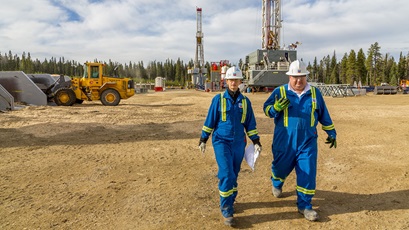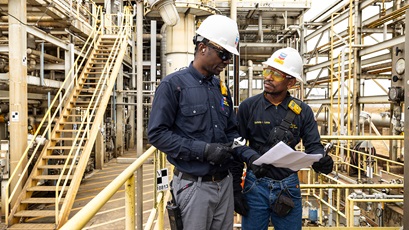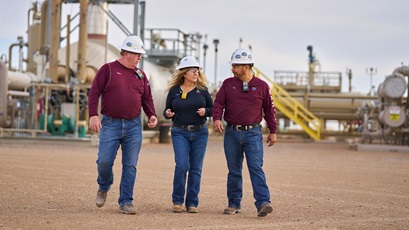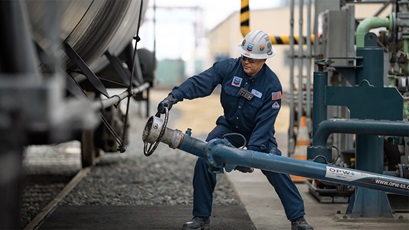our operations
titan drillship charts new territory
2 min read | august 26, 2024
Deepwater Titan is equipped with well control and hoisting systems that are the first of their kind.
In his spare time, AJ Ross loves restoring classic cars, like the 1985 Jaguar he recently brought back to life.
But while his personal time is spent resurrecting the past, his professional life is focused on shaping the future of offshore energy production.
As a Chevron wells manager, Ross recently participated in the most complex task of his 35-year career: helping bring a first-of-its-kind drillship to action.
Called Deepwater Titan, the Transocean-owned offshore drillship can drill as deep as 40,000 feet and handle pressures as high as 20,000 pounds per square inch (psi).
“We’ve never developed a deepwater reservoir like this before,” he said. “No one has.”
aj ross
wells manager
the titan
Weighing approximately 93,500 metric tonnes—approximately the size of a U.S. aircraft carrier—Deepwater Titan was commissioned to drill and complete Chevron’s Anchor Field in the U.S. Gulf of Mexico.
The ultra-deepwater drillship was constructed in Singapore and designed to reach deepwater reservoirs more than six miles below the surface. It can withstand 25% more pressure than any other vessel from Transocean’s fleet.
It was built specifically for Anchor because existing drilling rigs were not designed for the area’s deep, high-pressure oil reserves.
titan drillship
93,500 metric tonnes
length: 817 ft (249 m)
USS enterprise aircraft carrier
84,625 metric tonnes
length: 1,088 ft (332 m)
why it matters
In the U.S. Gulf of Mexico, where Chevron’s operations boast some of the lowest carbon intensity in its portfolio, many of the more accessible reservoirs have already been developed.
Companies like Chevron must tap into increasingly challenging environments to meet energy needs.
“To keep oil production at a level that is going to meet the needs of the economy, we have to continually push the envelope and safely develop more difficult oil reservoirs,” Ross said. “This technology enables us to do that.”

Outside of work, Ross enjoys restoring classic cars, like this 1990 Range Rover he is pictured working on.
out to sea
In 2023, Deepwater Titan commenced operations for Chevron and drilled its first exploration well, or test well. It has since moved to the Anchor Field. There, it will drill wells that will produce oil and gas at the new Anchor Platform.
When reflecting on the years spent perfecting the design, Ross said the result was as rewarding as putting the finishing touches on a restored car.
“It’s very exciting,” he said. “Putting all this equipment together and seeing it work on a well is tremendously satisfying.”
topics covered
related content
-

 explainer: where do oil and gas come from?
explainer: where do oil and gas come from?our operationsdecember 30, 2024
-

 gas development opportunities in sub-saharan Africa
gas development opportunities in sub-saharan Africaour operationsdecember 20, 2024
-

 AI boosts profitability in the permian basin
AI boosts profitability in the permian basinour operationsdecember 18, 2024
-

 new california legislation misleading, chevron exec says
new california legislation misleading, chevron exec saysour operationsnovember 26, 2024
chevron email updates
Subscribe to our newsletter to receive news and updates.



